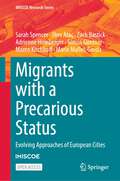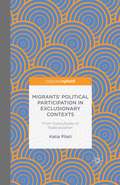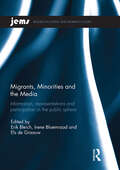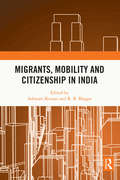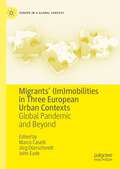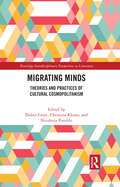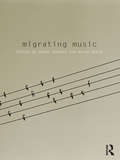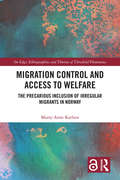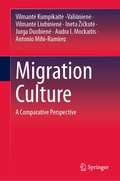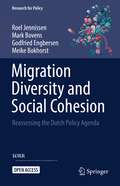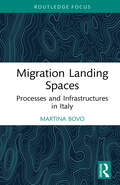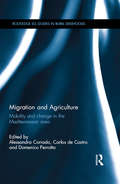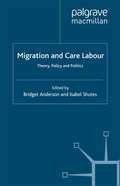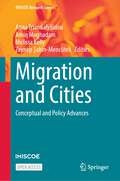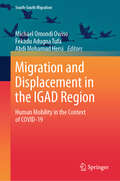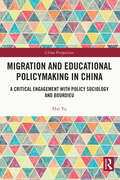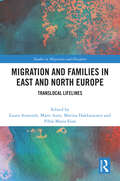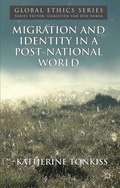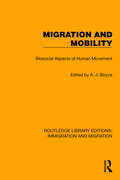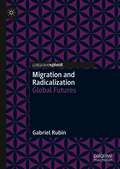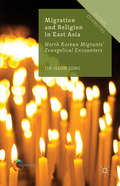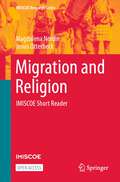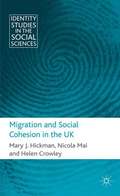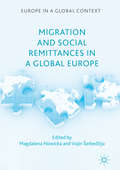- Table View
- List View
Migrants with a Precarious Status: Evolving Approaches of European Cities (IMISCOE Research Series)
by Sarah Spencer Simon Güntner Ilker Ataç Zach Bastick Adrienne Homberger Maren Kirchhoff Marie Mallet-GarciaThis open access book is an exploration of city responses to migrants with a precarious status in Europe. It provides new evidence and analysis from research on three cities in Austria, Germany and the UK: Vienna, Frankfurt and Cardiff. The book explores strategies and services of municipal authorities towards precarious migrants and their cooperation with non-governmental organisations (NGOs) in service provision. It focuses on healthcare, education, housing and access to advice; and particular attention is given to the situation of women.The book develops the concept of precarity in relation to migration status, and of horizontal governance arrangements within municipal authorities. It explores the tension between exclusion and inclusion of migrants who have limited rights of access to welfare services, and contributes evidence on the factors shaping municipal policy making, as well as on the framing of rationales for providing access to essential services.
Migrants' Participation in Exclusionary Contexts: From Subcultures to Radicalization
by K. PilatiThis insightful book analyzes the political engagement and marginalization of three of Milan's migrant groups, Filipinos, Egyptians and Ecuadorians. Bringing together data relating to the civic and political engagement of individual migrants, and of migrant organizational networks, the result is an examination of the consequences of the political exclusion of migrants, exploring the different ways in which they cope with this predicament. Such exclusion, the author argues, has three major impacts. It can transform migrant groups into political subcultures and engender externally-driven participation, but it can also lead to radicalization.
Migrants, Minorities, and the Media: Information, representations, and participation in the public sphere (ISSN)
by Irene Bloemraad Erik Bleich Els De GraauwThe media inform the public, help political and social actors communicate with each other, influence perceptions of pressing issues, depict topics and people in particular ways, and may shape political views and participation. Given these critical functions that the media play in society, this book asks how the media represent migrants and minorities. What information do the media communicate about them? What are the implications of media coverage for participation in the public sphere? In the past, researchers studying migrants and minorities have rarely engaged in systematic media analysis. This volume advances analytical strategies focused on information, representation, and participation to examine the media, migrants, and minorities, and it offers a set of compelling original analyses of multiple minority groups from countries in Europe, North America, and East Asia, considering both traditional newspapers and new social media. The contributors analyze the framing and type of information that the media provide about particular groups or about issues related to migration and diversity; they examine how the media convey or construct particular depictions of minorities and immigrants, including negative portrayals; and they interrogate whether and how the media provide space for minorities’ participation in a public sphere where they can advance their interests and identities. This book was originally published as a special issue of the Journal of Ethnic and Migration Studies.
Migrants, Mobility and Citizenship in India
by Ashwani Kumar R. B. BhagatThis book reconceptualizes migration studies in India and brings back the idea of citizenship to the center of the contested relationship between the state and internal migrants in the country. It interrogates the multiple vulnerabilities of disenfranchised internal migrants as evidenced in the mass exodus of migrants during the COVID-19 crisis. Challenging dominant economic and demographic theories of mobility and relying on a wide range of innovative heterodox methodologies, this volume points to the possibility of reimagining migrants as ‘citizens’. The volume discusses various facets of internal migration such as the roles of gender, ethnicity, caste, electoral participation of the internal migrants, livelihood diversification, struggle for settlement, and politics of displacement, and highlights the case of temporary, seasonal, and circulatory migrants as the most exploited and invisible group among migrants. Presenting secondary and recent field data from across regions, including from the northeast, the book explores the processes under which people migrate and suggests ways for ameliorating the conditions of migrants through sustained civic and political action. This book will be essential for scholars and researchers of migration studies, politics, governance, development studies, public policy, sociology, and gender studies as well as policymakers, government bodies, civil society, and interested general readers.
Migrants’: Global Pandemic and Beyond (Europe in a Global Context)
by John Eade Marco Caselli Jörg DürrschmidtThis book analyses the impact of the coronavirus pandemic on three ethnic minorities in three European cities: Bangladeshi in London, Turks in Stuttgart and Peruvians in Milan. Considerable debate has emerged during the pandemic concerning its impact on minorities, and although considerable quantitative data has been generated by epidemiologists, qualitative studies also have great relevance, socially and culturally as well as institutionally. While in normal circumstances the position of migrant communities is associated with unequal access to scarce resources such as wealth, power and social prestige, the coronavirus pandemic shifted the focus to more specific variables: living in segmented or overcrowded conditions, working in jobs with higher risk exposure, difficulties with online schooling, and lack of access to health care and information.The book will therefore be of interest to researchers and students of sociology, anthropology, global studies, migration and urban studies.
Migrating Minds: Theories and Practices of Cultural Cosmopolitanism (Routledge Interdisciplinary Perspectives on Literature)
by Didier CosteMigrating Minds contributes to the prominent interdisciplinary domain of Cosmopolitan Studies with twenty innovative essays by humanities scholars from all over the world that re-examine theories and practices of cosmopolitanism from a variety of perspectives. The volume satisfies the need for a stronger involvement of Comparative and World Literatures and Cultures, Translation, and Education Theories in this crucial debate, and also proposes an experimental way to explore in depth the necessity of a cosmopolitan method as well as the riches of cosmopolitan representations. The essays follow a logical progression from the situated philosophical and political foundations of the debate to interdisciplinary propositions for a pedagogy of cosmopolitanism through studies of modern and contemporary cosmopolitan cultural practices in literature and the arts and the concurrent analysis of prototypes of cosmopolitan identities. This trajectory allows readers to appreciate new historical, theoretical, aesthetic, and practical implications of cosmopolitanism that pertain to multiple genres and media, under different modes of production and reception. In the de-territorialized landscape of Migrating Minds, mental and sentimental mobility, rather than the legacy of place, is the key to an efficient, humanist response to deadening globalization.
Migrating Minds: Theories and Practices of Cultural Cosmopolitanism (Routledge Interdisciplinary Perspectives on Literature)
by Didier CosteAwarded the 2023 "René Wellek Prize for the Best Edited Essay Collection" by the American Comparative Literature Association, Migrating Minds contributes to the prominent interdisciplinary domain of Cosmopolitan Studies with 20 innovative essays by humanities scholars from all over the world that re-examine theories and practices of cosmopolitanism from a variety of perspectives. The volume satisfies the need for a stronger involvement of Comparative and World Literatures and Cultures, Translation, and Education Theories in this crucial debate, and also proposes an experimental way to explore in depth the necessity of a cosmopolitan method as well as the riches of cosmopolitan representations.The essays follow a logical progression from the situated philosophical and political foundations of the debate to interdisciplinary propositions for a pedagogy of cosmopolitanism through studies of modern and contemporary cosmopolitan cultural practices in literature and the arts and the concurrent analysis of prototypes of cosmopolitan identities. This trajectory allows readers to appreciate new historical, theoretical, aesthetic, and practical implications of cosmopolitanism that pertain to multiple genres and media, under different modes of production and reception. In the deterritorialized landscape of Migrating Minds, mental and sentimental mobility, rather than the legacy of place, is the key to an efficient, humanist response to deadening globalization.
Migrating Music (CRESC)
by Jason Toynbee Byron DueckMigrating Music considers the issues around music and cosmopolitanism in new ways. Whilst much of the existing literature on ‘world music’ questions the apparently world-disclosing nature of this genre – but says relatively little about migration and mobility – diaspora studies have much to say about the latter, yet little about the significance of music. In this context, this book affirms the centrality of music as a mode of translation and cosmopolitan mediation, whilst also pointing out the complexity of the processes at stake within it. Migrating music, it argues, represents perhaps the most salient mode of performance of otherness to mutual others, and as such its significance in socio-cultural change rivals – and even exceeds – literature, film, and other language and image-based cultural forms. This book will serve as a valuable reference tool for undergraduate and postgraduate students with research interests in cultural studies, sociology of culture, music, globalization, migration, and human geography.
Migration Control and Access to Welfare: The Precarious Inclusion of Irregular Migrants in Norway (On Edge: Ethnographies and Theories of Threshold Phenomena)
by Marry-Anne KarlsenOver the past decades, European states have increasingly limited irregular migrants’ access to welfare services as a tool for migration control. Still, irregular migrants tend to have access to certain basic services, although frequently of a subordinate, arbitrary, and unstable kind. Drawing on in-depth ethnographic fieldwork conducted in Norway, this book sheds light on ambiguities in the state’s response to irregular migration that simultaneously cut through law, policy, and practice. Carefully examining the complex interplay between the geopolitical management of territory and the biopolitical management of populations, the book argues that irregularised migrants should be understood as precariously included in the welfare state rather than simply excluded. The notion of precarious inclusion highlights the insecure and unpredictable nature of the inclusive practises, underscoring how limited access to welfare does not necessarily contradict restrictive migration policies. Taking the situated encounters between irregularised migrants and service providers as its starting point for exploring broader questions of state sovereignty, biopolitics, and borders, Migration Control and Access to Welfare offers insightful analyses of the role of life, territory, and temporality in contemporary politics. As such, it will appeal to scholars of migration and border studies, gender research, social anthropology, geography, and sociology.
Migration Culture: A Comparative Perspective
by Vilmantė Kumpikaitė -Valiūnienė Vilmantė Liubinienė Ineta Žičkutė Jurga Duobienė Audra I. Mockaitis Antonio Mihi-RamirezThis book examines the emergence of a culture of migration through outward migration as a country-specific phenomenon and analyzes it from different perspectives, covering various aspects such as the history of a country, its migration flows, migration push factors, social, economic, and political issues, as well as individual values. In the first part, the authors present a theoretical background on migration culture formation. This is followed by an in-depth analysis of migration culture in Lithuania in the second part. The presented case study is based on a quantitative survey study of almost 5.400 respondents. Further, the results of this case study are compared and adapted to other classical migration countries in the European Union, such as Spain or Portugal.The book, therefore, is a must-read for everybody interested in a better understanding of migration and the emergence of a culture of migration in different countries.
Migration Diversity and Social Cohesion: Reassessing the Dutch Policy Agenda (Research for Policy)
by Godfried Engbersen Mark Bovens Roel Jennissen Meike BokhorstThis open access book shows policymakers which initiatives work when responding to the increasing diversity in cities, towns and neighborhood's. In recent times, policymakers have grappled with ways of responding to this increase, which has resulted in a plethora of policy initiatives, some more effective than others. Bringing together a large amount of research and evidence-based policy recommendations, this book offers both a sense of strategic direction as well as more specific, actionable advice. It brings together a remarkable mixture of policy areas that touch upon issues of diversity, immigration policy, education, and labour policy. It is of benefit and importance to all those making policies for a country with increasing immigration.
Migration Landing Spaces: Processes and Infrastructures in Italy (Routledge Studies in Development, Mobilities and Migration)
by Martina BovoThis book looks at migrant landing spaces, exploring the processes and infrastructures which people encounter as they navigate urban spaces along the central Mediterranean route.The book argues that there remains a theoretical and practical difficulty in grasping the complexity of migrant arrivals. Migrants are often unsure whether they will stay or leave, their mobility is uncertain. Despite this, they face rigid binaries and categories within administrative policy and planning which tries to pin them down as either permanent or temporary. Drawing on extensive original research in southern Italy, this book suggests that we should instead think of ‘landing spaces’: parts of the city that work as infrastructures for landing, that allow for an open and dynamic use of the urban space and provide opportunities for encounter and information exchange as migrants consider their next steps.Combining an ethnographic gaze with insights from urban planning, architecture, geography, social sciences and migration studies, this book invites us to look closer at the interactions between people, practices and places as migrants land in Europe.
Migration and Agriculture: Mobility and change in the Mediterranean area (Routledge ISS Studies in Rural Livelihoods)
by Alessandra Corrado Carlos De Castro Domenico PerrottaIn recent years, Mediterranean agriculture has experienced important transformations which have led to new forms of labour and production, and in particular to a surge in the recruitment of migrant labour. The Mediterranean Basin represents a very interesting arena that is able to illustrate labour conditions and mobility, the competition among different farming models, and the consequences in terms of the proletarianization process, food crisis and diet changes. Migration and Agriculture brings together international contributors from across several disciplines to describe and analyse labour conditions and international migrations in relation to agri-food restructuring processes. This unique collection of articles connects migration issues with the proletarianization process and agrarian transitions that have affected Southern European as well as some Middle Eastern and Northern African countries in different ways. The chapters present case studies from a range of territories in the Mediterranean Basin, offering empirical data and theoretical analysis in order to grasp the complexity of the processes that are occurring. This book offers a uniquely comprehensive overview of migrations, territories and agro-food production in this key region, and will be an indispensable resource to scholars in migration studies, rural sociology, social geography and the political economy of agriculture.
Migration and Care Labour: Theory, Policy and Politics (Migration, Diasporas and Citizenship)
by B. Anderson I. ShutesThe provision of care has been widely referred to as facing a 'crisis'. International migrants are increasingly relied upon to provide care – as domestic workers, nannies, care assistants and nurses. This international volume examines the global construction of migrant care labour and how it manifests itself in different contexts.
Migration and Cities: Conceptual and Policy Advances (IMISCOE Research Series)
by Melissa Kelly Anna Triandafyllidou Zeynep Şahin-Mencütek Amin MoghadamThis open access book brings together different perspectives on migration and the city that are usually discussed separately, to show the special character of the urban context as a territorial and political space where people coexist, whether by choice or necessity. Drawing on heterogeneous situations in cities in different world regions (including Europe, North America, the Middle East, South, Southeast and East Asia and the Asia Pacific) contributions to this volume examine how migration and the urban context interact in the twenty-first century. The book is structured in four parts. The first looks at cities as hubs of cultural creativity, exploring the many dimensions of cultural diversity and identity as they are negotiated in the urban context. The second focuses on what lies outside the large urban centres of today, notably suburbs, while the third part engages with migration and diversity in small and mid-sized cities, many of which have adopted strategies to welcome growing numbers of migrants. Last but not least, the fourth part looks at the challenges and opportunities that asylum-seeking and irregular migration flows bring to cities. By providing a variety of empirical cases based on various world regions, this book is a valuable resource for researchers, students and policy makers.
Migration and Displacement in the IGAD Region: Human Mobility in the Context of COVID-19 (International Perspectives on Migration)
by Michael Omondi Owiso Fekadu Adugna Tufa Abdi Mohamud HersiThis book delves into the dynamics of human mobility and migration in the Intergovernmental Authority on Development (IGAD) region during the COVID-19 pandemic. It uses empirical sources from extensive fieldwork in the region to assess the impact of COVID-19 on conflict-induced internally displaced persons (IDPs), vulnerable and disadvantaged groups, the response of the government and IDPs coping mechanisms. It traces migration governance from regional and national perspectives and shares the opportunities and challenges in the region. The book presents the lessons learned and shares a way forward for the region during future pandemics. Chapters cover topics such as the protection of migrant workers’ rights, livelihoods of cross-border traders and communities and the gender dimension of COVID-19 impacts. It is a valuable read for students, policymakers, policy advisors, academics and all those interested in studies on migration and migration-related diversities.
Migration and Educational Policymaking in China: A Critical Engagement with Policy Sociology and Bourdieu (China Perspectives)
by Hui YuBy concentrating on the topic of school enrolment policy for rural-to-urban migrant children in China, this book analyses the unequal power relations and structural inequalities that can appear in the context of education. The author complements current knowledge by applying theoretical resources of policy sociology, in particular the thinking of Pierre Bourdieu, into analysis of educational policymaking in the Chinese context. He takes a policy trajectory approach to trace the (unequal) power relations and structural inequalities invested and realised in the school enrolment policy. Rooted in rich qualitative data from five metropolises, he examines both external influences of politics, economy and public policy on educational policy agenda setting and discursive practices within the educational policy cycle, inherent in the post-2013 restrictive school enrolment policy. Structural constraints and agency in the local context are also explored, indicating that the intersectional effects of political, economic, and civic logic can result in differentiated modes of policy enactment. The study will be of interest to scholars, students, policymakers and practitioners in helping address policymaking and social justice in education for migrants and other marginalised groups.
Migration and Families in East and North Europe: Translocal Lifelines (Studies in Migration and Diaspora)
by Laura Assmuth Marina Hakkarainen Pihla Maria Siim Marit AureThis book explores the phenomenon of familyhood across borders, examining the experience of translocal familyhood and the manner in which lifelines in and between countries are formed when individual family members spend long periods away from home. Drawing on long-term ethnographic research, it considers the emotions, social relations, materialities and discourses that occur within family lives between Estonia, Finland, Latvia, Lithuania, Norway, Romania, Russia and Sweden. With attention to the ways in which gender, generation, class and geography create and reinforce inequalities, strengths and vulnerabilities within and between families, it combines ethnographic, descriptive work with shorter photography-based chapters in order to allow textual and visual methods to complement one another. As such, it will appeal to scholars of sociology, geography and anthropology with interests in migration, transnationalism and the sociology of the family.
Migration and Identity in a Post-National World
by Katherine TonkissKatherine Tonkiss offers a succinct account of constitutional patriotism theory, specifically arguing that it involves a commitment to free migration. She draws on qualitative research to explore the implications of this claim for the dynamics of post-national identity and belonging in local communities.
Migration and Mobility: Biosocial Aspects of Human Movement (Routledge Library Editions: Immigration and Migration #16)
by Boyce A. J.Migration and Mobility (1984) examines the biological aspects of population movement, including genetic, anthropometric and psychological aspects. Other contributions deal with geographical and demographic features of human migration. Specific studies are described, and the theoretical framework used to describe population mobility is presented.
Migration and Radicalization: Global Futures
by Gabriel RubinThis book explores the connections between migration and terrorism and extrapolates, with the help of current research and case studies, what the future may hold for both issues. Migration and Radicalization: Global Futures looks at how migrants and terrorists have both been treated as Others outside the body politic, how growing migrant flows borne of a rickety state system cause both natives and migrants to turn violent, and how terrorist radicalization and tensions between natives and migrants can be reduced. As he contemplates potential global futures in the light of migration and radicalization, Gabriel Rubin charts a course between contemporary migration and terrorism scholarship, exploring their interactions in a methodologically rigorous but theoretically bold investigation.
Migration and Religion in East Asia: North Korean Migrants’ Evangelical Encounters (Global Diversities)
by Jin-Heon JungThis book sheds light on North Korean migrants' Christian encounters and conversions throughout the process of migration and settlement. Focusing on churches as primary contact zones, it highlights the ways in which the migrants and their evangelical counterparts both draw on and contest each others' envisioning of a reunified Christianized Korea.
Migration and Religion: IMISCOE Short Reader (IMISCOE Research Series)
by Jonas Otterbeck Magdalena NordinThis open access book introduces research on migration and religion with the focus on migration to western European countries from the 1950s and onwards. The book is an in-depth presentation of the main research trends as to methods, theories and empirical zones on migration and religion. In a unique way, the book brings together research about the topic aligning it with the experiences and urgencies of migrants. The first part of three introduces key concepts and presents main research trends over time. The second part deals with the processes of establishment – on an individual level as well as on a group and society level. The third and final part focuses on religious change in relation to religious ideas and habits. It further highlights religious creativity. The third part finishes with a discussion about challenges to research and what we still do not know enough about.
Migration and Social Cohesion in the UK
by Nicola Mai Mary J. Hickman Helen CrowleyBased on a flagship research project for the Joseph Rowntree Foundation's Immigration and Inclusion programme, this book argues that social cohesion is achieved through people (new arrivals as well as the long-term settled) being able to resolve the conflicts and tensions within their day-to-day lives in ways that they find positive and viable.
Migration and Social Remittances in a Global Europe
by Magdalena Nowicka Vojin ŠerbedžijaThis book explores migrant's global social remittances and their impacts on Europe. Exploring the topic from a range of disciplines including sociology, anthropology, geography and political science, the authors present empirical analyses covering a wide selection of international contexts across Europe, India, Iraq, Bolivia, Congo, Lebanon and Thailand. The book presents migrants not as Europe's 'cultural others' but as an integral part of Europe's global connection, and scrutinises the flows of knowledge, ideas, money, objects and values which result from the process of migration, rather than the migrants themselves. A valuable contribution to the literature on migrant transnationalism and globalisation, this book will appeal to scholars across the social sciences.
